 14th January 2007, Day 303
14th January 2007, Day 303São Paulo, Brazil
That's the first time this year. I have just typed the date at the top of the page and put '2006' rather than '2007'.
I'm alarmed that last year is sewn up in a box and placed on the shelf. I can pick it up for handy anecdotes at any point I suppose, but it was supposed to be a tool box of experiences rather than an ornament.
We've been travelling for almost ten months now, and our own lent has arrived and a more frugal and disciplined attitude is unavoidable. Or perhaps debt is unavoidable. This is rather appropriate in a Catholic country, don't you think? There is no need for a retrospective piece about last year just yet, let me tell you instead about the rather indulgent way we celebrated last year in our very own carnaval - like Shrove Tuesday, but with fewer eggs. I'd also like to add a few small observations on the difference between how the yuletide period is enjoyed in Latin America (or at least Chile and Brazil - note the picture of Rio's Corcovado above) and some my thoughts on social convention here.
In the UK, I think people suspect that Latin American Christians are more devout or serious than in north-western Europe. Certainly I expected there to be much more regular church going and rather more solemnity at Christmas. I don't know if that's true based on the opinions of the South Americans with whom I've spoken. At home, I believe people are resigned to a Yuletide with pieces on the news about retail profits and grottos in department stores. I was somewhat correct Xmas here had a little less of that, but from what I could tell in Chile and Brazil, it was more low-key than pious. Christmas in the British sense, did not begin until mid-November. Good Lord! I thought preparations started in August in Woolworths. While were in Perú - and especially Cusco - the usual Christmas tat familiar from home appeared, when I heard some Spanish carols being piped into a supermarket in Nasca. Later, in touristy Qosco we came across plenty of decorations, but in general it was escapable.
For the first time I was not with the family for Christmas day, but in Catholic Chile. I felt it was better not to mention my main contact with Catholics in England, is symbolically burning an effigy of one every November in my Grandparents's back garden.
 We amused ourselves in our own way over the Christmas period. We had hoped that when we arrived back at the Bellavista Hostel in Santiago, which we liked so much when we'd been in Chile the first time around, the owners would have something organised for Christmas day. Sadly the hostel cleared out somewhat over this period, so we were left to our own devices (although we were fortunate enough to have our friend Roberto to hang out with). We were in a quandry of sorts, but we are never truly bored when there is internet available.
We amused ourselves in our own way over the Christmas period. We had hoped that when we arrived back at the Bellavista Hostel in Santiago, which we liked so much when we'd been in Chile the first time around, the owners would have something organised for Christmas day. Sadly the hostel cleared out somewhat over this period, so we were left to our own devices (although we were fortunate enough to have our friend Roberto to hang out with). We were in a quandry of sorts, but we are never truly bored when there is internet available.
To amuse ourselves for a week in Chile without going blind (I mean damaging our eyes with computer monitors...) we bought some cheap guitars. This, by James' reckoning, was the best decision we'd made in the last 10 months. Pretty soon we were downloading guitar tablature and knocking out semi-competent cover versions of popular songs. Perhaps the only thing which caught our attention in a sleepy Santiago was Colo Colo (a Santiago football team) winning the national league and their supporters going nuts at Banquedano station. The Chilean championship was a consolation for Colo Colo fans after narrowly losing the Copa Libertadores da América, America's version of the European Cup, a mere two weeks earlier. When ever something of national significance happens and people gather in Chile, it's at Banquedano, much like Trafalgar Square in England. Only a couple of weeks earlier people met to celebrate Pinochet's death there. This was fortunately an occasion much less complicated in emotion.
Whilst on the topic of Pinochet, despite his death and the resulting fury or clebration or mourning, it was dead calm. Visiting the country directly before and after such an ostensibly significant national event, there was no clear change in the mood of the place that I could pick up on.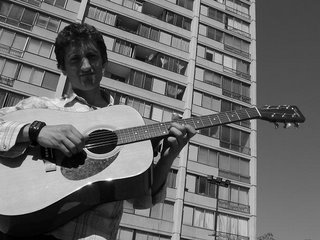 On Christmas Day itself we decided to jettison the traditional Christmas day altogether. We had a day without a roast dinner, presents (well at least James did, he bought me a guitar chord book - obviously a well brought up boy), Christmas specials, the family Christmas Day constitutional, cold weather or my dog dressed up in a silly new coat.
On Christmas Day itself we decided to jettison the traditional Christmas day altogether. We had a day without a roast dinner, presents (well at least James did, he bought me a guitar chord book - obviously a well brought up boy), Christmas specials, the family Christmas Day constitutional, cold weather or my dog dressed up in a silly new coat.
Instead we used our imagination. We sat in sunny Parque Forestral in central Santiago, played guitar and drank beer. Only later after he'd seen the photos did Roberto inform me that drinking in public parks was a criminal offence in Chile. During the day, which was passed in an alcoholic fug, we managed an impromtu photo shoot next to the Unimarc supermarket. One or two people reckon I look a bit like the front of an early Dylan LP in this picture. What a compliment! James has a similar arty shot on his equivalent blog entry. Of course, I was not vain enough to put mine at the top of the post ;-)
What is of more interest is not what we did, but what the Santiago residents were up to that day. There were lots of people about in the park, mainly people engaged in their own post gluttony amble, but also loads of kids in the swimwear dancing about in the fountain; it was beautifully sunny. I think we slotted in very well in an unconstrained atmosphere and we were a novelty of sorts to the kids. The energy levels were probably higher in the sun than under cloud in the UK, but people were still happy doing nothing in particular. Basically nobody does much on Christmas day, case closed.
Only one wispy cloud appeared that day. A drunk guy wandered up to us with his kid in a pretty jolly mood, and asked for a beer - no problem, it's Christmas, I thought and gave him a bottle. I immediately regretted it wondering how the kid looked after himself after his Dad passed out. The were plenty of similar folk in parks and on streets all over the world, of course. That's part of the global Christmas. Just like the rest of the year.
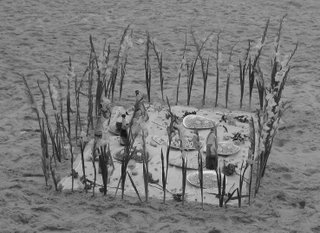 On to other matters. We arrived in Brazil on 27th December ready to wind up for the notorious New Years's Eve celebrations on Copocabana and Ipanema beach. We met up with Nathan (one of our friends from home) who by a happy coincidence was travelling in Brazil when we arrived. We started the process of familiarising ourselves with a different South America, and one where we couldn't speak ANY of the language. Pronouncing Portuguese is a bind if you haven't many pointers, and the to and fro of everyday life has been a touch more challenging since we got here.
On to other matters. We arrived in Brazil on 27th December ready to wind up for the notorious New Years's Eve celebrations on Copocabana and Ipanema beach. We met up with Nathan (one of our friends from home) who by a happy coincidence was travelling in Brazil when we arrived. We started the process of familiarising ourselves with a different South America, and one where we couldn't speak ANY of the language. Pronouncing Portuguese is a bind if you haven't many pointers, and the to and fro of everyday life has been a touch more challenging since we got here.
When I was at home preparing for this trip, I read the book A Death in Brazil by Peter Robb. The book focuses on the political climate of Brazil over the last 40 years, but he also interweaves the history of Brazil from the Portuguese landings to the present day. This was the first place that I heard about the Festa de Iemanjá, which takes place (in Rio at least) on New Year's Eve.
The Candomblé religion, of which Festa de Iemanjá is a part, was a religion belonging to African slaves who were brought to Brazil by the Portuguese from the 1500's until the 1800's when slavery was abolished. The religion itself was outlawed by the Portuguese, for being paganistic, but it persisted via clandestine ceremonies and the assimilation of some parts of Catholicism.
Iemanjá, herself, is Goddess of the Water and mother of all gods in Candomblé. She is also recognised as being St. Anne, patron of the sea. This double-life is something more complex than a simple rouse to throw the authorities 'off the scent': Candomblé is polytheistic and as such, not totally inflexible to absorbing other idols as Catholicism presumably might be. During the Festa de Iemanjá the Brazillians dress up in white and offer  Iemanjá gifts such as lit candles, flowers and rice, cast adrift from beaches in toy boats. You can see some of these items prepared in the photo above. This is to thank the goddess for her good will over the previous year and to urge favour in the year to come. It's quite a sight.
Iemanjá gifts such as lit candles, flowers and rice, cast adrift from beaches in toy boats. You can see some of these items prepared in the photo above. This is to thank the goddess for her good will over the previous year and to urge favour in the year to come. It's quite a sight.
When we arrived in Rio, there were several nights of preparation for the festival, which gives you some idea of it's significance. At our hostel in Urca, on the Sugar Loaf peninsula, there was a little cove where practice for the big event at Copocabana and elsewhere was taking place.
This is a picture of the Iemanjá Festival warm up in Urca cove. James has a night shot of the same place on his blog. We walked past this everyday while we were in Rio... because it was next to the internet cafe.
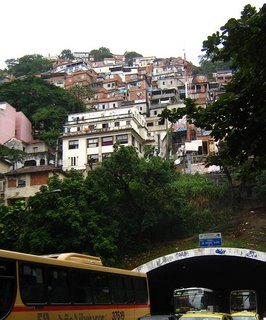 This is a favela in Copocabana. This is just a few streets back from the sea front.
This is a favela in Copocabana. This is just a few streets back from the sea front.
Apart from being surprised at the proximity of wealth and desititution in Rio, which is well documented , yet probably surprises every tourist, I won't attempt to talk about Favela life in Rio. I just don't know anything about it and it would just be speculation. There was one party, however, that everyone could go to, even if they weren't there by invite. The beaches on New Year's Eve. My photos of that night follow.
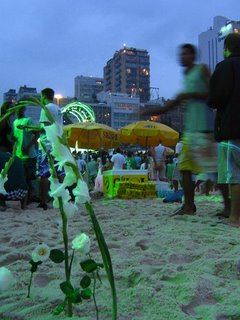 The big lighting rigs for the DJ on Ipanema light up one of the offerings to Iemanjá.
The big lighting rigs for the DJ on Ipanema light up one of the offerings to Iemanjá.
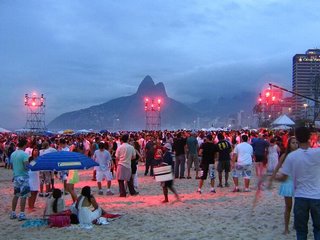 Ipanema beach. The very faint lights on the hills in the background are a favela.
Ipanema beach. The very faint lights on the hills in the background are a favela.
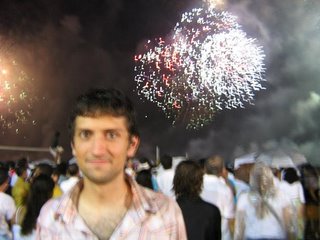 This was the best firework display ever, they were actually spectacular, rather than just being described as such by the local rag in the next day's newspaper. Following the fireworks the Iemanjá celebrations began, but it took us while to fight through the throng hemming in the sea from the beach before we could see anything. And when we got there we didn't see much. It was a meleé of dancing, jostling and swimming. I didn't see many offerings being pushed out in boats, I guess the rough tide would sink them. My trainers got wet.
This was the best firework display ever, they were actually spectacular, rather than just being described as such by the local rag in the next day's newspaper. Following the fireworks the Iemanjá celebrations began, but it took us while to fight through the throng hemming in the sea from the beach before we could see anything. And when we got there we didn't see much. It was a meleé of dancing, jostling and swimming. I didn't see many offerings being pushed out in boats, I guess the rough tide would sink them. My trainers got wet.
 Feliz Ano Novo. This gives you an idea of the atmosphere on Copocabana at about 00:01 on 1st January every year. We were as wobbly as the photo at this time, you'd expect no less...
Feliz Ano Novo. This gives you an idea of the atmosphere on Copocabana at about 00:01 on 1st January every year. We were as wobbly as the photo at this time, you'd expect no less...
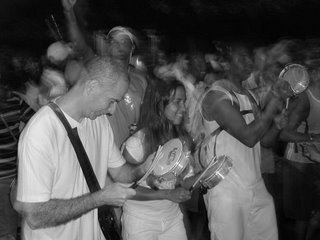 A samba band we joined in with as we moseyed down Avenida Atlantico which runs the length of Copocabana. The instrument you see being played is the Pandeiro (a bit like a tambourine) which is especially prominent in Partido alto Samba. We joined in the dancing for a while before wandering on to have our magpie gaze attracted by something else. We walked from Ipanema all the way to the Leme end of Copocabana and saw scores of street entertainers, primadonnas, exhibitionists, a great variety of food vendors, drug pushers, cops, rich, poor and plenty of awe-struck gringos.
A samba band we joined in with as we moseyed down Avenida Atlantico which runs the length of Copocabana. The instrument you see being played is the Pandeiro (a bit like a tambourine) which is especially prominent in Partido alto Samba. We joined in the dancing for a while before wandering on to have our magpie gaze attracted by something else. We walked from Ipanema all the way to the Leme end of Copocabana and saw scores of street entertainers, primadonnas, exhibitionists, a great variety of food vendors, drug pushers, cops, rich, poor and plenty of awe-struck gringos.
Whilst in Brazil we went to a fair few Samba clubs to dance, which James goes into on his blog. The big issue for me was the dancing. I awkwardly manouvre in my father's footsteps at dancing. Dancing in a Samba club? No chance, I'd be laughed out. Jumping up and down in an indie disco in the UK is not really dancing when you've seen this. To dance is something different altogether, out here. Oh! To be totally unselfconscious and entranced in the music. It ain't gonna happen to me. However, it was a surprise and relief to me that the atmosphere in the samba clubs we went to, did not feel in the least bit competitive, snobby, machoistic or agressive. The people I observed were polite and there to dance, often with a partner but happy enough without. They were not in the least worried about other people, as they themselves were - as I anticipated - fantastically fleet of foot. James was rather more adept than I at Samba, but I was soon contorting myself without fear of rebuke. The Bossa Nova or Samba musicians seemed sublime to me with more esoteric percussion than I'd previously even seen. It was just different and truly, cool.
 Nathan is certainly Mr. Party. He became a sort of Brazilian oracle to us while we were in Rio, as he has an interest and good knowledge of Bossa Nova as well as being a competant Bossa guitarist. Even I learnt the basic chord sequence and approximated of the rhythm of The Girl from Ipanema (inevitably I did whistle this whilst in Ipanema, but strangely nobody tried to strangle me). Nathan's generally an enthusiastic man, but his behaviour in Brazil makes me suspect he might be Rio bound permanently in the future. As I had imagined months before, he chastised me as a 'wet lettuce' for slinking off to bed at about 4am. It was pissing down with rain, sod you Nath ;-)
Nathan is certainly Mr. Party. He became a sort of Brazilian oracle to us while we were in Rio, as he has an interest and good knowledge of Bossa Nova as well as being a competant Bossa guitarist. Even I learnt the basic chord sequence and approximated of the rhythm of The Girl from Ipanema (inevitably I did whistle this whilst in Ipanema, but strangely nobody tried to strangle me). Nathan's generally an enthusiastic man, but his behaviour in Brazil makes me suspect he might be Rio bound permanently in the future. As I had imagined months before, he chastised me as a 'wet lettuce' for slinking off to bed at about 4am. It was pissing down with rain, sod you Nath ;-)
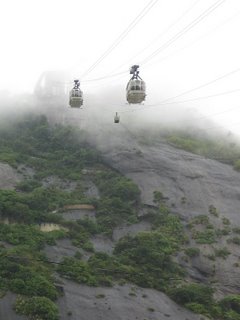 New Year hangover. Don't bother going up Sugar Loaf if it's this cloudy. Enough said.
New Year hangover. Don't bother going up Sugar Loaf if it's this cloudy. Enough said.

6 comments:
It all sounds so wonderful. I expect you to lead the samba dancing at Shannon's wedding!
Great pictures and breakdown of your holidays in Chile and Brazil. I especially like the one of you and James with your guitars. :o)
You call that a party? ;)
i will call you on your first day back at work. i need some course advice!
My god. I thought you'd disappeared off the earth dude!!!
Nice of your Mum to think of me.
I wil explain the Kung thing when I get back. I hope the postcards haven't annoyed you, but have helped you speculate on my mental health.
I expect to see you when we get back. NOT three months later. In fact I may drop round your house when you haven't slept for 6 days or something.
Getting married ain't for everyone. Me and Spangleforce will tip the balance upon our return.
Good Day Sprankle Juice!
I see the Brazilian New Years fest went well, I could see from your arty shots that there was alot of lovelies there and combined to the soggy trainers/beer, must have been great.
The National School will be having its first PCS Strike on Wednesday, so thats almost interesting.
I've booked a couple of holidays in April (Prague, then Cuba)... and nothing else to say apart from "take care of James" and stop frowning.
If you run out of money, trying fighting only using your elbows.
Its funny and sometimes very painful.
Norm.
Post a Comment